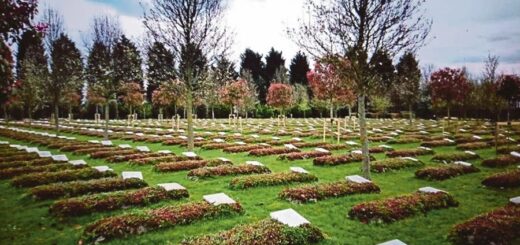Funerary Prayer in Absentia

Getting your Trinity Audio player ready...
|
Question
Following the death of the former deposed Egyptian President, many Muslims around the world performed Ṣalāt-ul-Janazah (funerary prayer) for him. Is this something that has precedent in Islam? Why are others seemingly opposed to it?
Answer
- Undertaking Ṣalāt-ul-Janazah (funerary prayer) in absentia does have precedent in Islam, as the Messenger of Allah (peace be upon him) did this for the Najāshi.
- It is acknowledged that some have argued that this is a one-off and that it is isn’t to be repeated by ‘lay-Muslims.’ Others have argued that it is specific only to the Najāshi.
- Our view, is that the Messenger of Allah (peace be upon him) is the ‘ustwatun ḥasana’, the most perfect and complete exemplar [Qur’ān, 33: 21]. From that designation, whatever the Messenger of Allah (peace be upon him) undertook after revelation began, can never be prohibited for the rest of his Ummah, unless that is, the exemption applies – it has been categorically proven that it relates only to what is specifically legislated for him. Furthermore, it is impossible for the Messenger of Allah (peace be upon him) to perform a deed which is prohibited for his Ummah or to leave what is obligatory for his Ummah.
- Previous eras did not have the technological advances that are now commonplace for us. Nowadays, one can learn of someone passing away almost instantaneously via social media platforms. There are Muslims for example who reside in Europe who may have relatives in other parts of the world, such as in the Far East. If they pass away in Europe, it is sometimes not always feasible to travel at short notice and make the Ṣalāt-ul-Janazah. Given such circumstances, we don’t see any reasonable legal impediment to those relatives performing Ṣalāt-ul-Janazah in absentia.
Reasoning
- Generally, several legal schools do not accept that the Ṣalāt-ul-Janazah to be done in absentia. Ibn Rushd (Vol.1, p. 279) provides a very short summary of these viewpoints: ‘The majority of jurists maintain that prayer over the dead is not to be performed in absentia. The body of the dead person must be present. Some said that an absent dead person may be prayed over following the tradition of the Najāshi. The majority maintain that this was an exceptional case specific to the Najāshi’
- Ibn Qayyim’s summary in Zād al-Ma’ād though, provides much greater elaboration of the different positions held:
It was not his guidance and Sunnah, peace be upon him, to undertake the prayer upon all that died in absentia. Many from among the Muslims that were created died and he didn’t pray for them in absentia. It is correct that he peace be upon him prayed the (funerary) prayer upon the Najāshi when he died. Consequently, the people differed concerning that into three (different) ways, first among them: That this is a legal rule from the Sunnah for this Ummah to undertake the (funerary) prayer for all in absentia and this is the statement of al-Shāfi’i and in one channel of report from him, Aḥmad. Abu Ḥanifah and Mālik said: This is specific (khāṣṣ) to him and not for other than him. Some of their followers said: It is permissible for him [sic. the Prophet] as his (death)bed was raised to him [sic. Najāshi] so that he may pray upon him. He thus prayed, viewing him as being present, albeit from the distance he and his companions were. His companions didn’t see him but they were following the Prophet peace be upon him in prayer. They said: this indicates that it wasn’t reported he prayed for all others who were absentees, other than him and leaving other than him (was the) Sunnah. His act of Sunnah is not for anyone after him, for this is no way for anyone after him to be able to see the deceased’s deathbed from a distance and raise it up for it to be prayed upon, knowing that the (funerary prayer) is specific to him.
It is narrated that he prayed upon Mu’āwiya ibn Mu’āwiya al-Laythi in absentia, however this isn’t authentic; contained in the isnād is al-‘Alā ibn Zayd. Ali ibn al-Madini said of him: ‘He was a forger in ḥadith.’ And it is narrated by Maḥbub ibn Hilāl from ‘Aṭā ibn Abu Maymunah from Anas. Al-Bukhāri said: ‘He is not corroborated in that.’
Sheikh al-Islam, Ibn Taymiyyah said: ‘The truth of the matter is that if the absentee died in a land and the prayer wasn’t performed upon them, then the prayer in absentia holds, as the Prophet peace be upon him did upon the Najāshi, because he died amongst the disbelievers and was not prayed upon. If he is prayed upon where he died, (then) there isn’t a prayer in absentia done, because the obligation with that prayer falls upon the Muslims. And the Prophet peace be upon him did not always perform prayer for the absent, thus it is a Prophetic tradition to perform as well as to leave and not to perform this prayer. And Allah knows best.’
All three statements are maintained by the legal school of Aḥmad. The most correct, is that detailed and famous among his followers, to undertake the (funerary) prayer absolutely.
- In al-Muḥalla [Vol 3, p. 361, Issue 580: Prayer upon what is found of a dead Muslim] Ibn Ḥazm argues: ‘Pray upon what is found of a dead Muslim even if it is the nail or hair (that is present) and greater than that, and wash and shroud (the deceased); except where it relates to a martyr, as there is no washing but wrapping and burial. And a deceased Muslim is prayed over, even in absentia and (even if) there is nothing of him.’ He bases his argument upon the evidences relating to the Najāshi, which further sets out that the order issued from the Messenger of Allah (peace be upon him), to ‘Pray upon your companion,’ was generic, covering the present and in absentia. Seeking to make a further specification to that without evidence is not lawful.
- Taking issue with the schools Ibn Ḥazm writes [Vol 3, p. 363]:
Mālik and Abu Ḥanifah dissuaded this, their followers claiming the matter to be specific to the Najāshi; and this claim is a lie without proof, and with Allah is all tawfeeq. If they are to say: (was the) act done by one among the companions after the Messenger of Allah peace be upon him? We say unto them: has it been reported from any one of the companions that they repudiated or denied it? Thereafter we say unto them: there is no proof in one other than the Messenger of Allah peace be upon him. He the exalted said: So that people should not have a plea against Allah after the (coming of) Messengers [4: 165].
- The point is further reinforced by way of summary [al-Muḥalla 3, p. 399, Issue 610: Praying upon the dead in absentia with the Imām in congregation] and he writes: ‘The Messenger of Allah peace be upon him prayed for the Najāshi and he died in the land of Abyssinia. His companions prayed with him in rows. This is a consensus from them and it is not permissible for it to be infringed.’
- There are a large body of authentic traditions which set out that the Messenger of Allah (peace be upon him) notified the companions that the Najāshi had passed away and that they collectively performed the funerary prayer in absentia for him. In his Sunan, Tirmidhi outlines that several traditions on this matter are reported from many companions, amongst them: Abu Hurayrah, Jābir ibn Abdullah, Abu Sa’eed, Ḥudhaifa ibn Aseed and Jarir ibn Abdullah. Such traditions can be easily read in the major notable collections as well as the lesser known. For example, in al-Jāmi al-Ṣaḥīḥ al-Mukhtaṣr, Bukhāri has the following:
حدثنا إبراهيم بن موسى أخبرنا هشام بن يوسف أن ابن جريج أخبرهم قال أخبرني عطاء أنه سمع جابر بن عبد الله رضى الله عنهما يقول قال النبي صلى الله عليه وسلم قد توفي اليوم رجل صالح من الحبش فهلم فصلوا عليه قال فصففنا فصلى النبي صلى الله عليه وسلم عليه ونحن صفوف.
Ibrāhim ibn Musa narrated to us Hishām ibn Yusuf reported to us that Ibn Jurayj reported to them, he said, ‘Aṭā reported to me that he heard Jābir ibn Abdullah, may Allah be pleased with him, saying the Prophet peace be upon him said: Today a righteous man (rajulun Ṣāliḥ) from Abyssinia, has passed away, so let us prayer upon him. He (Jābir) said: We lined up in rows and after that the Prophet peace be upon him led the prayer and we were in rows.
حدثنا يحيى بن بكير حدثنا الليث عن عقيل عن ابن شهاب عن سعيد بن المسيب وأبي سلمة أنهما حدثاه عن أبي هريرة رضى الله عنه قال نعى لنا رسول الله صلى الله عليه وسلم النجاشي صاحب الحبشة، يوم الذي مات فيه فقال استغفروا لأخيكم
Yaḥya ibn Bukeer narrated to us al-Layth narrated to us from ‘Uqayl from Ibn Shihāb from Sa’eed ibn al-Mussayib and Abu Salamah that they are narrating it from Abu Hurayrah, may Allah be pleased with him, he said the Messenger of Allah peace be upon him gave us the news regarding the death of al-Najāshi on the day he passed away. He said: Ask Allah’s forgiveness for your brother.
حدثنا مسدد حدثنا يزيد بن زريع حدثنا معمر عن الزهري عن سعيد عن أبي هريرة رضى الله عنه قال نعى النبي صلى الله عليه وسلم إلى أصحابه النجاشي، ثم تقدم فصفوا خلفه فكبر أربعا
Musadad narrated to us Yazeed ibn Zureeh’ narrated to us Ma’mar narrated to us from al-Zuhri from Sa’eed from Abu Hurayrah, may Allah be pleased with him, he said the Prophet peace be upon him informed his companions about the death of al-Najāshi and then he went ahead (to lead the prayer) and the people lined up behind him in rows and he said four Takbir.
In Ṣaḥīḥ Muslim there is the narration from Imrān ibn Ḥuṣṣain:
وحدثني زهير بن حرب وعلي بن حجر قالا حدثنا إسماعيل ح وحدثنا يحيى بن أيوب حدثنا ابن علية عن أيوب عن أبي قلابة، عن أبي المهلب، عن عمران بن حصين، قال قال رسول الله صلى الله عليه وسلم إن أخا لكم قد مات فقوموا فصلوا عليه. يعني النجاشي وفي رواية زهير إن أخاكم
And Zuhayr ibn Ḥarb and Ali ibn Ḥujr narrated to us, they said Ismā’il narrated to us (ḥawala) Yaḥya ibn Ayub narrated to us Ibn ‘Ulaya narrated to us from Ayub from Abu Qilābah from Abu Muhallab from Imrān ibn Huṣṣain he said the Messenger of Allah peace be upon him said: A brother of yours has died, so stand up and offer prayer for him. That is to say, the Najāshi and in the channel transmitted by Zubayr (the words are): ‘Your brother.’
And in the Sunan of Ibn Mājah the tradition of Ḥudaifah ibn Aseed:
حدثنا محمد بن المثنى حدثنا عبد الرحمن بن مهدي عن المثنى بن سعيد عن قتادة عن أبي الطفيل عن حذيفة بن أسيد أن النبي صلى الله عليه وسلم خرج بهم فقال صلوا على أخ لكم مات بغير أرضكم قالوا من هو قال النجاشي
Muḥammad ibn al-Muthanna narrated to us Abdur-Raḥman ibn Mahdi narrated to us from al-Muthanna ibn Sa’eed from Qatādah from Abu Tufayl from Ḥudhaifa ibn Aseed that the Prophet peace be upon him led them out and said: Pray for a brother of yours who has died in a land other than yours. They said: Who is he? He said: Najāshi.

- Allah has given his Messenger (peace be upon him) the designation of the most perfect and complete exemplar, ‘‘ustwatun ḥasana’ –
لَّقَدْ كَانَ لَكُمْ فِي رَسُولِ اللَّهِ أُسْوَةٌ حَسَنَةٌ لِّمَن كَانَ يَرْجُو اللَّهَ وَالْيَوْمَ الْآخِرَ وَذَكَرَ اللَّهَ كَثِيرًا
Certainly, you have in the Messenger of Allah an excellent exemplar for him who hopes in Allah and the latter day and remembers Allah much [33: 21]
Part of this designation includes that it is impossible for the Messenger of Allah (peace be upon him) to perform a deed which is prohibited for his Ummah or to leave what is obligatory for his Ummah.
- Indeed, it is the Messenger of Allah (peace be upon him) who has established this precedent of funerary prayer in absentia. To restrict or specify it, requires evidence, not mere assertion or resort to other than the legal texts in Islam.
A word on Tyranny
“For one simple reason (the tyrant answered), and herein lies the supreme misery of despotic power; it is not possible even to let go of it. How could the life of any single tyrant suffice to square the account?”
Xenophon, Hiero the Tyrant
- History will be a harsh judge upon the present age and how it will be eventually characterised. The experience of tyranny is an enduring theme, often indeed the defining characteristic of the age. No amount of adulation given to tyranny can unblunt how it cuts through the lives of so many. And not dissimilar to previous eras, tyranny has its own host of sycophants; whether it be from the naive or the gullible, to the scholarly figure seeking to twist the texts of revelation. Those in service to tyranny will habitually try to depict it as the status quo.
- Yet tyranny, however vile, never lasts. Despite whatever glitz it may be coated in, the life of the tyrant is truly miserable, as Xenophon, more than two-millennia ago aptly noted:
If, then, you will but thoughtfully consider it, you will discover it is the ordinary person who is chiefly blest in these relations. While of tyrants, many have been murderers of their own children, many by their children murdered. Many brothers have been murderers of one another in contest for the crown, many a monarch has been done to death by the wife of his bosom or even by his own familiar friend, by him of whose affection he was proudest. How can you suppose, then, that being so hated by those whom nature predisposes and law compels to love him, the tyrant should be loved by any living soul beside?
- And there is neither profit or blessing in tyranny, whether it be in this life or the hereafter. Call to mind the verses of the noble of Qur’ān in al-Mujādilah –
Have you not seen those who give their loyalty to people with whom God is angry? They are neither with you nor with them, and knowingly swear to lies. Allah has prepared a severe torment for them: what they do is truly evil. They have used their oaths to cover up [their false deeds], and barred others from the path of Allah. A humiliating torment awaits them– Neither their wealth nor their children will be of any use to them against Allah – they will be the inhabitants of Hell, where they will remain.
On the day Allah raises them all from the dead, they will swear before Him as they swear before you now, thinking that it will help them. What liars they are! Satan has gained control over them and made them forget Allah. They are on Satan’s side, and Satan’s side will be the losers. Those who oppose Allah and His Messenger will be among the most humiliated. Allah has written: I shall most certainly win, I and My messengers.’ Allah is powerful and almighty [Qur’ān, 58: 14/21].
- We ask Allah to accept the dua’ for the deceased, detailed below as narrated on the authority of ‘Auf ibn Mālik, may Allah be pleased with him, and cited in the collection of Imām Muslim:
اللَّهُمَّ اغْفِرْ لَهُ وَارْحَمْهُ وَعَافِهِ وَاعْفُ عَنْهُ وَأَكْرِمْ نُزُلَهُ وَوَسِّعْ مُدْخَلَهُ وَاغْسِلْهُ بِالْمَاءِ وَالثَّلْجِ وَالْبَرَدِ وَنَقِّهِ مِنَ الْخَطَايَا كَمَا نَقَّيْتَ الثَّوْبَ الأَبْيَضَ مِنَ الدَّنَسِ وَأَبْدِلْهُ دَارًا خَيْرًا مِنْ دَارِهِ وَأَهْلاً خَيْرًا مِنْ أَهْلِهِ وَزَوْجًا خَيْرًا مِنْ زَوْجِهِ وَأَدْخِلْهُ الْجَنَّةَ وَأَعِذْهُ مِنْ عَذَابِ الْقَبْرِ أَوْ مِنْ عَذَابِ النَّارِ
O Allah! Forgive him, have mercy upon him, give him peace and absolve him. Receive him with honour and make his grave spacious; wash him with water, snow and hail. Cleanse him from faults as Thou wouldst cleanse a white garment from impurity. Requite him with an abode more excellent than his abode, with a family better than his family, and with a mate better than his mate. Admit him to the Garden, and protect him from the torment of the grave and the torment of the Fire.



